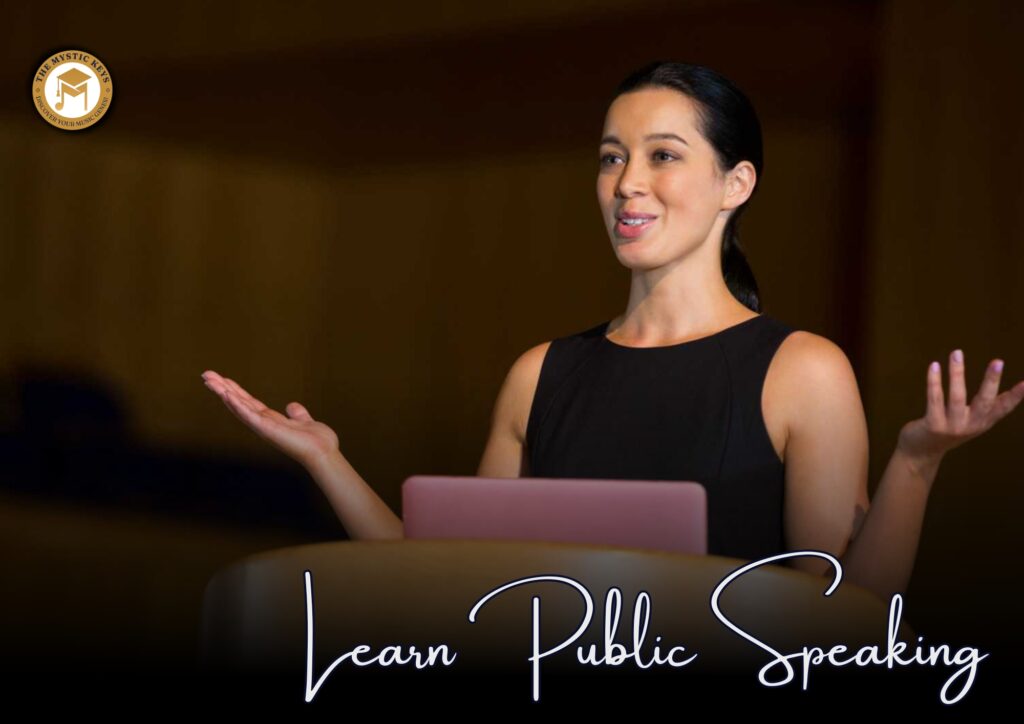How can I learn public speaking? A Guide to Confidence
Public speaking is a powerful skill that can open doors to countless opportunities, both personally and professionally. Whether you’re presenting in front of a small group or addressing a large audience, the ability to speak confidently and persuasively can have a lasting impact. In fact, mastering public speaking not only enhances your communication skills but also boosts your career prospects and personal growth. If you’ve ever wondered how to learn public speaking and develop this essential skill, you’re in the right place. This blog will provide you with the tools, tips, and techniques to excel in the art of public speaking, ultimately helping you master public speaking with ease and confidence.

Understanding the Importance of Public Speaking
Before diving into the practical steps, it’s essential to first understand why public speaking is such a vital skill. Not only is it about talking to a crowd, but it’s also about effectively communicating ideas, influencing opinions, and creating a meaningful connection with your audience. In fact, when you master public speaking, you unlock the ability to communicate with clarity and confidence, leaving a lasting impact on your listeners. Whether you are presenting at a business meeting, delivering a speech at a wedding, or advocating for a cause, public speaking allows you to express your thoughts persuasively and with power. Thus, mastering this skill opens doors to numerous opportunities for personal and professional growth.

Overcoming the Fear of Public Speaking
For many, the thought of speaking in public triggers anxiety and fear. It’s perfectly normal to feel nervous, but learning to manage this fear is the first step toward becoming a confident speaker.
- Acknowledge Your Fear: Understand that you’re not alone. Many people experience stage fright, but with practice, it can be overcome.
- Deep Breathing and Relaxation: Use relaxation techniques like deep breathing and meditation before speaking to calm your nerves and focus your mind.
- Visualization: Visualize yourself speaking confidently. Imagine the audience reacting positively and your speech going smoothly.

Know Your Audience
One of the keys to effective public speaking is understanding your audience. Tailoring your message to meet the needs, expectations, and interests of the people you’re addressing will help you connect with them on a deeper level.
- Research Your Audience: Whether you’re speaking to professionals, students, or a general audience, learn about their background, knowledge level, and interests.
- Adjust Your Language: Use language that resonates with your audience. Avoid jargon when speaking to non-experts, and use more technical language for specialized groups.

Mastering the Basics of Speech Writing
A well-structured speech is the foundation of any successful public speaking engagement. To learn public speaking, it’s essential to understand that a good speech doesn’t just convey information—it tells a compelling story, engages the audience, and leaves a lasting impression. Therefore, crafting a speech with clear organization and purpose is key. Let’s explore the critical elements of speech writing:
- Introduction: First, start with a hook to grab your audience’s attention. This could be a thought-provoking question, a surprising fact, or a relevant anecdote. This initial moment is crucial, as it sets the stage for the rest of your speech. Once you’ve captured their attention, introduce your topic and give them a preview of what to expect.
- Body: The body of your speech should contain 2-3 main points, each supported by evidence or examples. This is the core of your message, so make sure it’s organized and logical. Next, the body of your speech should contain 2-3 main points, each supported by solid evidence or examples. This is the core of your message, and it’s essential to ensure that it’s organized and logical. To maintain your audience’s attention, structure your points clearly, making sure each one builds upon the previous. By providing examples and data, you’ll reinforce your arguments and keep the audience engaged.
- Conclusion: Finally, your conclusion should summarize the main points you’ve discussed and leave your audience with a memorable closing thought. It’s important to end with a strong, impactful statement that reinforces your message and calls the audience to action or reflection. This will ensure that your speech resonates long after you’ve finished speaking.

Practice, Practice, Practice
No one becomes a great public speaker overnight. The more you practice, the more natural and confident you’ll become. Here are some ways to practice effectively:
- Rehearse in Front of a Mirror: Practicing in front of a mirror helps you observe your body language and facial expressions. Make adjustments as needed to improve your delivery.
- Record Yourself: Record your speeches and presentations, then review them. Pay attention to your tone, pacing, and body language. This will help you identify areas for improvement.
- Practice in Front of Friends or Family: Getting feedback from trusted friends or family can be incredibly helpful. Ask them for constructive criticism to refine your performance.
- Join a Public Speaking Group: Consider joining groups like Toastmasters, which offer a supportive environment for learning and practicing public speaking. This provides the opportunity to speak in front of an audience and receive feedback from fellow speakers.

Perfecting Your Body Language
Your body language is just as important as the words you say. Non-verbal communication can convey confidence, sincerity, and enthusiasm, or it can create distance and confusion. Here’s how to improve your body language:
- Posture: Stand tall with your shoulders back. Good posture conveys confidence and helps you project your voice.
- Gestures: Use hand gestures to emphasize key points, but avoid overdoing it. Make sure your gestures feel natural and add to your message.
- Eye Contact: Make eye contact with your audience to build rapport and convey sincerity. Avoid looking down at your notes too often or staring at a single person.
- Movement: Move around the stage or room to engage your audience. Avoid staying in one spot, which can make you seem stiff and unapproachable.

Vocal Techniques for Effective Delivery
How you use your voice can make a significant difference in how your message is received. To learn public speaking, it’s crucial to pay attention to your vocal delivery. Here are some vocal techniques to improve your effectiveness:
- Pacing: Vary your speaking speed to emphasize important points. For instance, speaking too quickly can make you sound nervous, while speaking too slowly may cause your audience to lose interest. By adjusting your pace, you can maintain attention and create emphasis when needed.
- Volume: Ensure that your voice projects so everyone in the audience can hear you clearly, but be cautious not to shout. In fact, adjusting your volume based on the size of the room and the importance of the point you are making will help maintain a strong presence without overwhelming your listeners.
- Tone and Pitch: Using a varied tone will allow you to express emotion, which in turn keeps your audience engaged. A monotone delivery, on the other hand, can quickly become boring and disengaging. Therefore, incorporating pitch changes can convey passion and prevent your speech from sounding flat.
- Pauses: Pauses are incredibly powerful. They allow your audience to absorb key points and create anticipation for what’s to come. Pausing before or after an important statement can add weight and drama to your message, making it more impactful.
By practicing these vocal techniques, you can significantly enhance your public speaking abilities, ensuring your voice resonates with clarity, authority, and emotion.

Handling Questions and Feedback
Many public speaking events include a Q&A session, where the audience has the opportunity to ask questions or provide feedback. Therefore, handling these moments with grace is crucial for maintaining your credibility and poise. To effectively learn public speaking, it’s essential to be prepared for these interactions and respond thoughtfully.
- Prepare for Questions: First, anticipate potential questions and prepare responses ahead of time. By doing so, you can address inquiries with confidence. If, however, a question stumps you or if you don’t know the answer, be honest and offer to follow up after the presentation.
- Stay Calm: Moreover, if a question catches you off guard or seems particularly challenging, take a moment to compose yourself before responding. It’s important not to rush; instead, pause to collect your thoughts. Keep your responses brief, clear, and respectful to maintain control of the situation.
- Engage with Your Audience: Finally, always show appreciation for questions and feedback. This demonstrates that you value your audience’s input and helps build rapport, strengthening your connection with them. By engaging thoughtfully, you also reinforce your credibility as a speaker, solidifying your role as an expert in your field.

Continuous Improvement
Public speaking is a skill that requires constant development. Even the best speakers work on improving their craft. Here are some ways to continue growing as a public speaker:
- Seek Feedback: After each speech or presentation, ask for feedback from your audience or peers. Constructive criticism will help you identify areas for improvement.
- Learn from Others: Watch speeches by skilled public speakers. Analyze their techniques and incorporate what resonates with you into your own presentations.
- Challenge Yourself: Take on more challenging speaking opportunities to push your limits. The more you challenge yourself, the more you’ll grow as a speaker.

Conclusion
Learning public speaking is a journey, not a destination. With practice, patience, and a commitment to improvement, anyone can become a confident and effective public speaker. By understanding your audience, mastering the art of speech writing, practicing consistently, perfecting your body language and vocal techniques, and continuously seeking feedback, you’ll be well on your way to becoming a dynamic communicator who leaves a lasting impact on your audience. To further enhance your skills, consider enrolling in a Public Speaking Course at The Mystic Keys. With expert guidance and tailored training, you’ll gain the confidence and tools to communicate with clarity and purpose. So, step up to the stage and start speaking—your voice has the power to inspire, influence, and create change!








